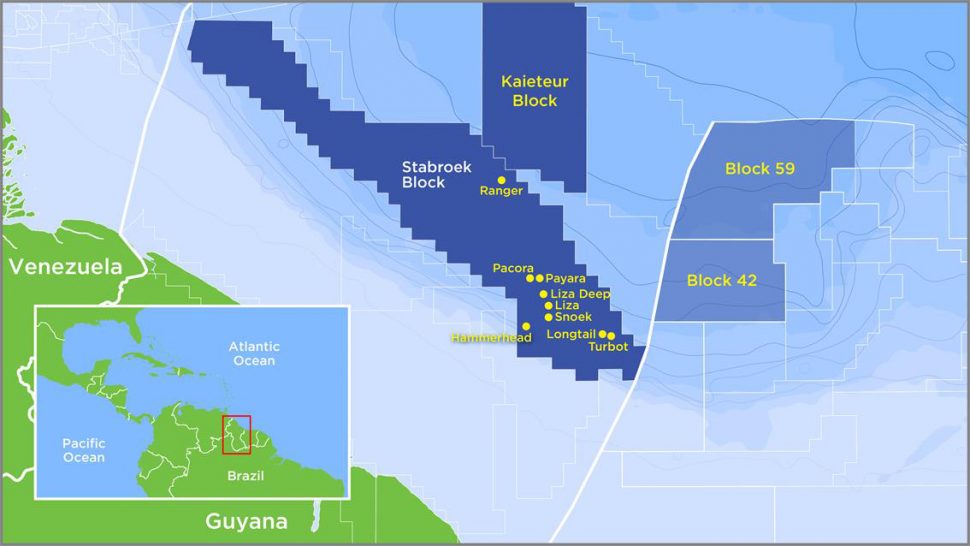ExxonMobil has made its ninth oil discovery offshore Guyana at the Hammerhead-1 well, marking its fifth discovery in the Stabroek Block in the past year.
The company said the latest find proves a “new play concept” for potential development. Drilling at the well found approximately 197 feet (60 meters) of high-quality, oil-bearing sandstone reservoir. The well was safely drilled to 13,862 feet (4,225 meters) depth in 3,373 feet (1,150 meters) of water. The Stena Carron drillship began drilling on July 27, 2018.
“The Hammerhead-1 discovery reinforces the potential of the Guyana basin, where ExxonMobil is already maximizing value for all stakeholders through rapid phased developments and accelerated exploration plans,” Steve Greenlee, the president of ExxonMobil Exploration Company was quoted as saying in a statement. “Development options for Hammer-head will take into account ongoing evaluation of reservoir data, including a well test,” he added.
The company will now undertake other analyses before it could give an estimated quantification of the discovery.
ExxonMobil has said that Guyana continues to play a significant role in its growth plans and that appraisals of the eight wells before Hammerhead-1 have not yet been completed and would mean that the 4 billion barrels of oil-equivalent recently announced could climb further.
Hammerhead-1 is situated approximately 13 miles (21 kilometers) southwest of the Liza-1 well and follows previous discoveries on the Stabroek Block at Liza, Liza Deep, Payara, Snoek, Turbot, Ranger, Pacora and Longtail. Those prior discoveries led to the announcement of an estimated recoverable resource of more than 4 billion oil-equivalent barrels and the potential for up to five floating production, storage and offloading (FPSO) vessels producing more than 750,000 barrels per day by 2025.
There is potential for additional production from significant undrilled targets and plans for swift exploration and appraisal drilling, ExxonMobil said.
And as announced at its second quarter earnings call, the company said that a second exploration vessel, the Noble Tom Madden, is due here in October to accelerate exploration of high potential opportunities and will begin drilling at the Pluma prospect, which is approximately 17 miles (27 kilometers) from Turbot.
Liza Phase 1, which is expected to begin producing oil by early 2020, will utilize the Liza Destiny FPSO vessel to produce up to 120,000 barrels of oil per day. Construction of the FPSO and subsea equipment is well advanced. Pending government and regulatory approvals, Phase 2 is intended for sanctioning by the end of this year. It will use a second FPSO designed to produce up to 220,000 barrels per day and is expected to be producing in 2022. A third development, Payara, will aim at sanctioning in 2019 and use an FPSO designed to produce approximately 180,000 barrels of oil per day as early as 2023.
The Stabroek Block is 6.6 million acres (26,800 square kilometers). ExxonMobil affiliate, Esso Exploration and Production Guyana Limited, is operator and holds 45 percent interest in the Stabroek Block. Hess Guyana Exploration Ltd. holds 30 percent interest and CNOOC Nexen Petroleum Guyana Limited holds 25 percent interest.
According to Exxon’s project overview of works in the Stabroek Block, the Liza-1 well discovery was announced in May 2015. The Liza-2 well was drilled and tested in July 2016, while the Liza-3 well was drilled in October 2016, confirming a world-class resource discovery in excess of 1 billion oil-equivalent barrels. (Appraisal drilling at Liza-3 identified an additional high quality deeper reservoir directly below the Liza field, which is estimated to contain resources between 100 and 150 million oil-equivalent barrels.) The Liza-4 well was drilled in March 2017 and more than 197 feet of high-quality, oil-bearing sandstone reservoirs were identified, which will underpin a potential Liza Phase 2 development. Appraisal drilling at Liza 3 identified an additional high quality deeper reservoir directly below the Liza field, which is estimated to contain resources between 100 and 150 million oil-equivalent barrels.
Skipjack-1 was drilled in September 2016; this did not encounter commercial quantities of hydrocarbons.
The Payara-1 well discovery was announced in January 2017; Payara is ExxonMobil’s second oil discovery on the Stabroek Block and was drilled in a new reservoir – encountering more than 95 feet of high quality, oil bearing sandstone reservoirs. The Payara-2 well discovery was announced in July 2017; Payara-2 encountered 59 feet (18 meters) of high-quality, oil-bearing sandstone reservoirs. The Payara discovery is estimated at approximately 500 million oil-equivalent barrels.
The Snoek-1 well discovery was announced in March 2017; Snoek is ExxonMobil’s third oil discovery on the Stabroek Block and was drilled in a new reservoir – encountering 82 feet (25 meters) of high-quality, oil-bearing sandstone reservoir. The Turbot-1 well discovery was announced in October 2017; Turbot is ExxonMobil’s fifth oil discovery on the Stabroek Block and was drilled in a new reservoir – encountering approximately 75 feet (23 meters) of high-quality, oil-bearing sandstone reservoir.
The Ranger-1 well discovery was announced in January 2018; Ranger is ExxonMobil’s sixth oil discovery on the Stabroek Block and was drilled in a new reservoir- encountering approximately 230 feet (70 meters) of high-quality, oil-bearing carbonate reservoir. The Pacora-1 well discovery was announced in February 2018; Pacora is ExxonMobil’s seventh oil discovery on the Stabroek Block and was drilled in a new reservoir- encountering approximately 65 feet (20 meters) of high-quality, oil-bearing sandstone reservoir. The Sorubim-1 was drilled in April of this year but this well did not encounter commercial quantities of hydrocarbons.
One month after, on May 25th, drilling at the Longtail well began and in June it was announced that it found 256 feet (78 meters) of high-quality, oil-bearing sandstone reservoir.










